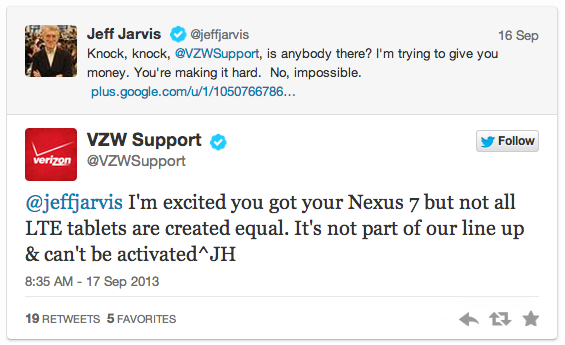Verizon blocks Nexus 7 and will probably get away with it (original) (raw)
Violation of open access rules? Nope, just "reasonable network management."
Google's Nexus 7. Credit: Andrew Cunningham
Google's Nexus 7. Credit: Andrew Cunningham
Verizon Wireless, by virtue of winning spectrum in the 700MHz C Block at auction in 2008, is required to abide by open access rules. In this slice of airwaves, license owners "shall not deny, limit, or restrict the ability of their customers to use the devices and applications of their choice."
Yet when a Verizon customer who bought an LTE-enabled Nexus 7 from Google attempted to add the device to his shared data plan, he was told by the official Verizon Wireless support account on Twitter that "not all LTE tablets are created equal. It’s not part of our line up & can’t be activated."

That's a clear-cut violation of the open access rules, right? Verizon says it's not—but it is now promising to enable the Nexus 7 after finishing up some tests to make sure it works properly. The customer, well-known journalist and professor Jeff Jarvis, filed a complaint with the Federal Communications Commission. But as one customer advocate told Ars, even if the FCC takes action, it will come too late to prevent Verizon from dragging its feet in approving the device.
A Wi-Fi-only version of the new Nexus 7 was released at the end of July, with the promise of an LTE model that works with Verizon, AT&T, and T-Mobile to follow soon after. Jarvis bought his a week ago and took it to a Verizon Wireless store where he "was told that it could not be added because Verizon had not yet added the IMEI numbers to its system."
The Nexus 7 does work on Verizon's network, as Jarvis proved when he took a SIM from his Chromebook Pixel and put it in the Nexus. But he couldn't use both at once, since "Verizon won’t give me a sim [for the Nexus 7] and add it to my account," his blog says.
His complaint to the FCC says:
Verizon is refusing to connect my tablet though it has been approved by the FCC and is compliant with standards such that it is also being offered and being activated on AT&T’s and T-Mobile’s LTE networks. Further, Verizon is instead attempting to require that I buy a tablet from them. This is a clear violation of the letter and intent of the openness requirement on Block C.
I later tested Verizon’s claim that the device could not be connected. I took the SIM from my Chromebook Pixel, placed it in the Nexus 7 LTE table, and it connected to the Verizon network just fine. So the issue is not that the device cannot be connected but that Verizon will not connect it.
Thus it is clear that Verizon is violating the terms of the Block C spectrum auction and of its consent decree with the Enforcement Bureau of the Commission.
Verizon: Just be patient
Verizon responded directly to the head of the FCC's enforcement bureau yesterday, saying that it does plan to authorize the tablet but that the open access rules don't require it to do so right away:
Google announced in July that this tablet will run on the Verizon Wireless network. The manufacturer of the Nexus 7 subsequently submitted the device for our certification process in August, and that process has proceeded apace. In fact, we expect final certification of the device will come shortly. Once the device is certified, we will work with Google to enable the device to be activated on our 4G LTE network within a matter of days.
Verizon Wireless's certification process is fully consistent with the Commission's C Block rules. Those rules require Verizon Wireless to allow customers to use their choice of devices, but they also recognize that this obligation only applies in the case of devices that comply with the provider's published technical standards. The Commission recognized that providers may "use their own certification standards and processes to approve use of devices and applications on their networks so long as those standards are confined to reasonable network management," and the Commission allowed providers flexibility in implementing these standards and processes. Verizon's certification process for third-party devices like the Google Nexus 7 is a straightforward way to ensure that devices attached to the Verizon Wireless network do not harm the network or other users. Although Verizon Wireless uses one of the most rigorous testing protocols of any carrier, the process generally takes only between four and six weeks. Certification is done by third party labs approved by Verizon Wireless, and selected by the device manufacturer.
Despite Verizon's promise to enable the Nexus 7 eventually, Free Press Policy Director Matt Wood told Ars that "there should be compliance right out of the gate." Wood thinks "it's a clearcut violation of the spirit of the rules and the policy behind it. Verizon has some technical and legal arguments they've made in response to Jeff's complaint, and it comes down to whether their certification process really is reasonably necessary or not. To my understanding, Nexus 7s work on AT&T and T-Mobile, and they're the ones without this open access requirement. So if they can assure themselves quickly enough that the device won't cause harmful interference to other users or their network, it's a little bit ironic to say the least that the carrier with the open access requirement has a much more drawn out process for making that certification."
The FCC's open access rules previously forced Verizon to stop blocking tethering apps for users with limited data plans. On the non-wireless side, Verizon Wireless parent company Verizon is trying to overturn the FCC's network neutrality law.
Verizon's claim that it needs to certify LTE devices before allowing them on its wireless network is "a level of bureaucracy [that] certainly seems inconsistent with a 'right to attach,'" Public Knowledge Senior Staff Attorney John Bergmayer told Ars. He also said it's a "far cry from Carterfone," an FCC decision from 1968 that allowed devices to connect to AT&T's network as long as they caused no harm.
We've asked the FCC if it considers Verizon's actions to be a violation and if it can take any action against the company, but we haven't heard back yet. If Verizon does allow the device soon, the problem will go away "far more quickly than the FCC's enforcement bureau can spring into action," Wood said. He hopes the FCC will "at least prod and poke at Verizon's explanation," to figure out "why is it such a lengthy process when the device works on these other networks."
When Verizon told Jarvis that the Nexus 7 "can't be activated," it directed him to a list of products that do work on its network, presumably in the hopes that he'd buy a different tablet, directly from Verizon.
Given that Verizon initially said the Nexus 7 cannot be activated and then promised to certify the device, Jarvis asked on his blog if the company is "succumbing to pressure and the requirements of the FCC’s regulations."
Listing image: Andrew Cunningham
Jon is a Senior IT Reporter for Ars Technica. He covers the telecom industry, Federal Communications Commission rulemakings, broadband consumer affairs, court cases, and government regulation of the tech industry.


